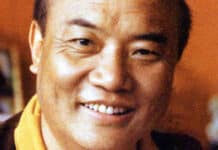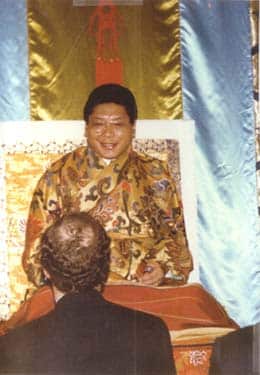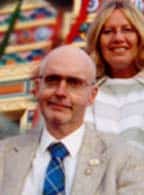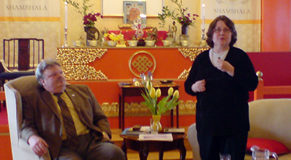The first thing that has to be said about Jonathan is that he was enormously generous. He gave money, time and energy and, amazing as it may seem, he apparently gave without much expectation or ambition and even without much concern for his own security. He was also a remarkable practitioner, especially during his final years when he mixed each new stage of his advancing illness with practice. Without a doubt, his dedication to Chögyam Trungpa Rinpoche and to practice were unshakeable.
I think it’s fair to say that Jonathan was a somewhat awkward person. He tended to be uncomfortable around people and he never liked being the center of attention. But it’s also quite apparent that Jonathan grew to accept these qualities in himself; he became comfortable with his awkward nature. Although he might have seemed timid to people who didn’t know him well, his friends talk about his shocking directness and biting wit. “Quietly brazen” is the term that his old buddy Alan Sloan used to describe him.
Jonathan first heard of Chögyam Trungpa Rinpoche in 1970 when his mother, Nancy Eric, showed him a brochure she had picked up about Tail of the Tiger (now Karme Chöling). Jonathan read the brochure, picked up a copy of Meditation in Action, and decided to visit Tail of the Tiger as soon as possible. When he got there, he requested an interview and was shown into a room with a young Asian gentleman who was smoking a cigarette. Jonathan assumed that this was the waiting room and that this gentleman was also waiting to see Chögyam Trungpa. After awhile, the man turned to Jonathan and said, “So why did you come here”
“I’m here to meet the man who wrote this book,” said Jonathan holding up his copy of Meditation in Action.
The gentleman looked at Jonathan and said, very slowly, “My book …”
Jonathan was completely startled. He never would have imagined that this was Chögyam Trungpa. He quickly became a dedicated student. Nancy Eric, by the way, also became a dedicated student of Trungpa Rinpoche. She started the Washington Dharma Study Group in the early 1970s and is currently a Chakrasamvara practitioner living in Huntington, Massachusetts.
Starting in the late-summer or early-autumn of 1970, Jonathan began his first solitary retreat some say for six months, some say for a year. Rinpoche’s retreat instructions to Jonathan were to sit and to practice the Sadhana of Mahamudra every day. Jonathan had been reading The Hundred Thousand Songs of Milarepa and was determined to practice with Milarepa-like intensity. During his retreat, he sat without moving for long sessions and in the process permanently injured his knees. In later years Jonathan laughed about this attempt to emulate Milarepa saying he had been naive and overly serious.
At some point, either shortly before or after his long retreat, Jonathan came into a sizeable inheritance. This sudden wealth troubled him; he felt that it wasn’t his money. Having it was confusing for him and he decided that he really didn’t want it. Jonathan met with Rinpoche, told him how he felt about the money, and asked, “Can I give this money to you” Rinpoche said yes, and Jonathan gave him all, or perhaps almost all, of his inheritance. If he kept any amount of money for himself, it was very small. Jonathan’s father was not at all pleased to hear what Jonathan had done with his inheritance and Jonathan himself expressed some doubts about his own motivations. Was this a neurotic or intelligent response to having money It seems that he lived with this as an open question and he remained very humble about his act of generosity. In fact, very few people knew the extent of his generosity until after his death.
It is fairly well known in the Shambhala community that Jonathan’s gift covered the down payment for Rocky Mountain Dharma Center, which was between thirty and forty thousand dollars. (Please speak up if you know the exact amount.) But sometime in the early 1970s, Jonathan’s inheritance was also used to consolidate the ownership of Tail of the Tiger, a transaction that required an additional thirty-to-forty thousand dollars. These two payments left a balance of about twenty thousand, which Rinpoche used for other projects. Jonathan’s gift was a huge amount of money in the early 1970s and it was possibly the first large donation that was given to Rinpoche and the community.
But Jonathan’s generosity didn’t end there. He continued to donate smaller amounts of money to various causes whenever he could. After his death, several people came forward and said that Jonathan had helped them financially and asked them not to tell anyone. When his bank accounts were closed after his death, it was discovered that he had been helping a number of different causes with automatic withdrawals. Some were just little donations and others were larger. One personal example: About a year ago I received an unsolicited donation from Jonathan for the Chronicle Project.
Through the early 1970s Jonathan was a pioneer in the new frontier of American dharma that Trungpa Rinpoche was creating. He was an early leader, teacher, and meditation instructor. He led the first dathün at RMDC, along with Dan Meade. He was one of Rinpoche’s early interview secretaries, and later he was one of the first directors of Karma Dzong. He was also one of the more mature people in the early community. Amongst a cast of colorful and sometimes wild characters, Jonathan stood out as steady and reliable qualities that Rinpoche seemed to appreciate and utilize. When almost all of Rinpoche’s close students were invited to attend the first seminary in 1973, Jonathan was left behind. Rinpoche asked him to stay and look after things in Boulder.
Although Rinpoche may have trusted Jonathan’s maturity, he never seemed to stop challenging Jonathan to go further. On several occasions, Rinpoche pushed Jonathan to go beyond his limitations and to take on the kinds of roles and activities that were most difficult for him. Starting in late 1976, Rinpoche sent ambassadors to the larger dharmadhatus, or city centers. These men and women were senior teachers, something like acharyas in the current era. But they were also Rinpoche’s personal representatives. Their job was to lead and inspire the dharmadhatus, nurture new students, teach buddhadharma and later Shambhala Training, and, to some extent, embody Rinpoche’s vision. Needless to say, this was a great honor and a difficult job. At times, I think all the ambassadors felt like they were swimming in deep, dangerous, and uncharted waters. Jonathan was among the first ambassadors to be appointed, fulfilling that role in Chicago from 1977 to 1980. Although he was an experienced teacher and a devoted student, he was an unlikely leader from a conventional point of view. He appeared timid and withdrawn, avoided conflict, and was generally uncomfortable in social situations. He later said that being an ambassador had been excruciating for him, especially in the beginning.
Soon after he arrived in Chicago, Jonathan got together with Tami Moore, now Tamara Eric. Their relationship was like an illustration for the adage that opposites attract. She was young and playful, full of life, and in her own words, a real party girl. He was rather stiff and not all that much fun. She says, “It was like living with my meditation instructor.” They survived a rocky start, learned to appreciate each other’s unique qualities, and were married in 1978. Jonathan and Tamara had two children: Matthew born in 1983 and Valerie in 1986.
After Chicago, the Erics returned to Boulder where Jonathan was faced with the prospect of having to get a job in the real world, so to speak. He spoke with Rinpoche about what he should do and Rinpoche encouraged him to find a high-powered position of some kind. Jonathan protested that he had no credentials and no real career path. But Rinpoche insisted that none of that mattered and repeated that Jonathan should take a leap into a high-powered job. As Larry Mermelstein, another old friend of Jonathan, put it: “It was horrendous for Jonathan to hear this from Rinpoche. He did try in some manner to follow Rinpoche’s advice, but it was very difficult for Jonathan to promote himself, and I think it’s fair to say that he never made that particular leap.” He did however, become a computer programmer, and that is how he supported himself and his family until he got too sick to work in 1988.
I heard one more story in which Rinpoche leaned on Jonathan to go beyond his hesitant nature. At one point, during a discussion with Rinpoche about something or other, Jonathan said that he could never imagine being in Rinpoche’s shoes. Rinpoche’s response was very cutting and direct. He said that Jonathan was copping out, that he had to be willing to fill his shoes. He said, “That’s the whole point.”
As Jonathan was settling into the routine of working as a programmer and having a young family, his health started to become an issue. He seemed to need more and more sleep, he would sometimes drop his briefcase on the way to work, and he started to become uncharacteristically irritable. Then in April 1987, just weeks after Rinpoche’s death, Jonathan was diagnosed with Multiple Sclerosis. Life at home with young children became difficult and the marriage became strained. After several difficult years of trying to make things work, Tamara and Jonathan separated. Jonathan continued to have a very close relationship with his children, and he and Tamara remained close friends until his death.
For the last twelve or thirteen years of his life, Jonathan lived alone. When I visited him in March 2002, the air in his apartment was thick with incense. He was impressive in a way that is hard to put into words; he was focused, present, settled. As I left his apartment, I felt that I was leaving an isolated retreat cabin. He told me that he spent a lot of time practicing, but recently I began to find out just how much practice Jonathan had done in that apartment. He practiced incessantly. He practiced through all of the progressive stages of MS. As his body became ever more cumbersome and ordinary activities became more difficult, he maintained a steady commitment to daily practice. This long retreat included an extended period (at least a year) of Sadhana of Mahamudra practice, during which he maintained a very demanding daily schedule. When this schedule eventually became too difficult, he decided after much serious deliberation to adopt a somewhat lighter practice schedule. He developed a strong sense of connection and devotion to the protector Ekajati, set up a shrine to her in his apartment, and kept a candle burning there throughout the day. Another important component of this daily practice was the Great Clouds Of Blessings, Supplication for Magnetizing the Phenomenal World, composed by Mipham Rinpoche in 1879. He loved this supplication and did it at least once every day. At some point during the last year of his life, someone gave him a copy of The Song of Gyalwa Gotsangpa on How to Practice with Illness. This text became a very important part of his daily practice and he shared it with a number of his friends before he died. When asked, he was very straightforward about his illness. Alan Sloan says, “He would talk about his double vision or his incontinence or the things that were painful in the most direct terms, but there was never even a hint of ‘Oh poor me.'”
There is always a danger of speaking too highly of the deceased. In our desire to honor our friends, we err on the side of endowing them with more than human qualities. With that in mind, it’s probably important to add that Jonathan was sometimes frustrated, lonely, and confused, and that he had his share of emotional upheaval just like the rest of us. He also worked hard, with ever so much dedication, to follow the teachings he had been given. He was one of the Vidyadhara’s truly genuine and devoted students. He was an important person in our collective history, a pioneer and a dear heart. We more than miss his clarity, dry wit, and awkward dignity.
The Song of Gyalwa Gotsangpa on How to Practice with Illness
Gyalwa Gotsangpa was an important holder of the Drukpa Kagyu lineage. This text became an important part of Jonathan Eric’s daily practice routine during the last year of his life. This translation by Elizabeth Callahan is the one that Jonathan used. It is reproduced here with her permission.
The Song of Gyalwa Gotsangpa on How to Practice with Illness
When illness manifests physically,
It is the maturation of previously having beaten others
Now ripening.
When those who have committed negative actions are sick,
Do not summon a doctor
And do not perform rituals for their demons.
The illness itself must be taken as the path.
My guru, the dharma-master, taught that
Illness should not be regarded as a problem.
It purifies obscurations, gives rise to good qualities,
And enhances the development of realization.
When an illness appears, feel joyful.
Practice like this:
Meditate, thinking repeatedly,
“How sad it is that sentient beings are tormented
With illnesses just as I am.”
Repeatedly make aspiration prayers, saying,
“May my illness
Purify the illnesses and sufferings of
All sentient beings,
Whose numbers are as vast as the extent of space.”
After that, look directly at the illness.
An illness is not an existent thing
With a shape, color, and so forth;
It is spontaneously present as emptiness.
By recognizing this, illness is liberated in its own place.
But if illness arises once again,
Supplicate the exalted guru with longing:
“Grant your blessings
So this illness may arise as the path.
Grant your blessings
so I do not try to prevent it or encourage it.
Grant your blessings
so it may arise as an aid.”
Supplicate strongly in this way.
Again, look directly at the illness.
How could this illness,
which did not exist previously,
Become existent later
Rest relaxed within its nonexistence.
The illness itself will manifest as the dharmakaya.
(c) Elizbeth M. Callahan.
In memory of Jonathan
by Ginny Lipson
I’ve known Jonathan since forever, but the beginning of our closest connection came over six years ago when I was doing a phone calling of sadhakas for the feast committee. We talked for a long time, and I realized that he had continual “retreat mind.” After that, I wanted to become close friends with him and visit on a regular basis.
We met every few weeks since then, (with a few gaps) until his death in October. We talked of many things, but most memorable were our conversations about dharma. He was such a sincere person, with such incredible faith, devotion and conviction, that his sense of sacred outlook was amazing. I often thought of him as “so pure.” Now I think: “Blessed are the pure of heart, because they will see God!”
Equal to this quality of purity, Jonathan was one of the most intense people I’ve known. He was 100% serious about practice, (including maintaining a sense of humor!). Practice and study seemed to be crucial to his life. He told me of the intensity of his experiences in practicing the Sadhana of Mahamudra every day for such a long time (over a year) and of his intense commitment to Trungpa Rinpoche to honestly and continuously face the experiences of his own mind.
Jonathan talked a lot about extreme experiences and about the importance of practicing through extreme experiences. I don’t think he ever talked directly about what experiences he worked with in his practice. But just being around him, I assumed that he was referring to the frustrations of a prolonged, and painful sickness and the emotional intensity that comes along with intense practice. He told me that he was only doing the best he could in his practice. He referred to himself as a mere child in this regard, while others, the many respected teachers in the sangha that he appreciated, he referred to as grown-ups. I think this shows his incredible humility. It’s impossible to judge someone else’s practice. But, from what I saw, he was a grown-up in every way, especially when it came to practice. During his last few years, as his illness became more and more cumbersome, he doggedly continued to face whatever mental experiences came up. At some point, he got very serious about Ekajati as a protector. He read me passages from Trungpa Rinpoche’s poems about her. He made a special shrine to her, which was very prominent in his apartment, and included a lit candle all day long every day. He felt she was a very real presence, as were all the protectors. And towards the end of his life he SERIOUSLY and LITERALLY practiced, The Song of Gyalwa Gotsangpa on How to Practice with Illness.
Jonathan’s illness was a horrendous burden, which he bore bravely and stoically. Although it made it difficult for him to get out, he seemed to maintain as much independence as possible, going out on his electric wheelchair to the library, doctor’s office, or to various meetings, including the Karma Dzong wheelchair ramp/accessibility meetings. He devised elaborate methods to tend to his health needs so that it would be possible for him to go to the stupa consecration.
Early last year, he wanted to be more involved with the community, and presented a small class in his home based on Jeremy Hayward’s book, Letters to Vanessa. There was a very small attendance, but it was wonderful to hear him present the salient points of the book, which provoked profound and engaged discussion. This past summer, although his health had been miserable for months, he made elaborate plans to go to the Vajra Assembly at Shambhala Mountain Center. Although he paid dearly for it with his health from the exertion he put out to do so, he was so excited about what happened there. He was so inspired by the teachings, and also by the recognition he received from the sangha for his past donation to actually buy the land up there that made everything possible. He was also deeply touched by the blessings and appreciation given to him by Trungpa Rinpoche’s half-brother and nephew who were visiting Shambhala Mountain Center.
Jonathan really wanted to write a memoir of his many stories spanning the history of his relationship with Trungpa Rinpoche and the Boulder sangha. Unfortunately, he was never able to complete or even begin that project.
I met with Jonathan less than a week before he died. At that time, he was so cheerful and optimistic. He had a new plan to deal with his current horrendous health problems, and seemed very bright about the future. However, he told me he felt he could die at any moment, so he had begun to live that way. Practicing every moment! He had recently participated in an interview with Lama Mingyur (Ed Podvoll), and felt freshly inspired as to how to proceed with his daily practices. He particularly stressed Gyalwa Gotsangpa’s song on how to practice with illness and printed me out a copy on the spot.
A few hours after he died, I went to sit with his body. It was so peaceful in the room, there was a tremendous sense of space. I was so sad, but found myself reflecting on all the times we had met in his home, including times I had brought Surmang Khenpo Tsering over to meet with him. There was always such a powerful practice atmosphere being with Jonathan, that it would typically bring me around to my senses by just being there. That evening, I was once again brought around to my senses, my mind stopped spinning, and an incredibly helpful insight about my particular personal current dilemma arose on the spot. Being able to sit with Jonathan was an incredible gift, and the next day when I practiced at home, I had profound experiences that were caused by his memory, yet impossible to repeat or express. I thought, “Oh Jonathan! Wow!” Do I ever miss him!
2004 Ginny Lipson
The following is a collection of sangha mail that was posted in the days following Jonathan’s death in October 2003.
From: Tania Leontov, 22 February 2004
I would like to share two things concerning Jonathan. One was that I was the first person Jonathan met when he reached Tail of the Tiger. This blue folkswagen bus pulled up and out came a hippie musician. He said he was in despair and i asked if he wanted an interview with Rinpoche. Which happened. He told me years later that he was on the verge of suicide when he arrived and the interview saved his life.
The other thing – Jonathan and I were half of the committee, the last three or four years, to make the Boulder Shambhala Center disabled accessible. I dont know if anyone else knew but behind his even and undemanding mien there was a terrible sadness and bitterness that he could not enter the center and be in the environment soaked with the Vidyadharas presence. It was as if, in a way, the community had abandoned him.
from Christine Keyser
***
After Jonathan gave his inheritance to Rinpoche he got a job washing dishes at the bakery next door to Karma Dzong when the center was at 1111 Pearl Street. When I meditated there in the morning and smelled the delicious fragrance of fresh baked bread I thought of Jonathan hard at work washing pots and pans in the bakery kitchen below — polishing the mirror of Bodhi to benefit sentient beings.
…. In those early days, Jonathan often complained to me about his “failure” with women. Once at a party he sang a satirical song he wrote, “Oh beautiful ball stomping woman..” I got mad at him because it was about a woman who he was attracted to but had rejected his tentative advances. I thought he was being a horrible sexist and hypocritical, so I poured some beer over his head. He screamed, thrust his guitar down, and fled the room. He never said anything to me about it afterwards, but I always felt guilty for publicly humiliating such a kind, gentle man.
… I sent my comments because you mentioned that we deify and idolize people after they’re gone and forget their warts and weaknesses. One of the reasons why Jonathan was such a wonderful person is because he openly displayed all of his weaknesses for the world to see, enabling us to also witness his transformation through his steadfast dharma practice. I could have written much more because I used to know Jonathan quite well in the early days. But a few words often goes a long way.
Take care,
Chris
***
from Jim Lowrey
he bought the land of many names
the first name was Eric’s Estates
imagine twenty hippies
and one dork
no problem
he was the superior man
I broke his guitar once
threw a beer can half full at him
when he wouldn’t play
the night they drove old dixie down
he paid to fix it
he apologized
he was the superior man
I could have said hello in August
but did not make the effort
goodbye Jonathan
you were a superior man
***
from Binny Clark
For those who are younger than old dogs, I’d like to footnote Jim Lowrey’s heartfelt poem about Jonathan Eric.
Jonathan came into a sizeable inheritance in his twenties, which had been held in trust until then. Much to the consternation of his father, he gave it to the Vidyadhara to purchase “the land of many names”: The Land, RMDC, RMSC, now Shambhala Mountain Center — an act of generosity which has benefited thousands over the past thirty years.
Certainly a superior man.
with love for an old friend,
***
from Stefan Carmien
Jonathan is gone, like a soft breeze.
he tread lightly,
chipper attitude in hell.
We think that to be heroic is
to make the grand gesture-
and he did, once, and the boss
let him marinate in his own generosity;
Would be that we could one day be so
brave and lucky
I sat with you last week, we looked up and
let the fish leap up together
and, like everyone else, suddenly you are gone
like a fish leaping into space.
Goodbye my friend who once gave
meditation instruction, in Tejas, to both of me.
***
from Carol Hyman
It is touching, humbling and inspiring to realize how many lives Jonathan touched. A little more than twenty-eight years ago, I showed up in Boulder, looking for Trungpa Rinpoche. Most of the people I met seemed to feel it was their responsibility to try to cut my trips (of which that very speedy and neurotic young woman had gracious plenty!) After several such encounters with members of the community, I was disheartened enough to contemplate heading on to California to check out Zen Center, when Jonathan, then the director of Karma Dzong, took me under his wing. His kindness, generosity, decency, friendliness and delight inspired me to stay put in Boulder. He sported quite proudly a large turquoise ring that he said Trungpa Rinpoche had given him, telling him it would help magnetize people to him. Dearest Jonathan, your heart was truly all that was needed for that.
with a genuine heart of sadness and love,
***
from Paul V. Songer
… on a personal level, he was at once nerdy, intense, totally passionate, and had a rather dry, subtle, and unpredictable sense of humor. He wrote songs that were kind of folky, had definite melodies, and were well constructed — better than average, but not party music. He was not a dynamic public speaker, but seemed to be regularly put into the spotlight and generally made the best of being put on the spot and charging forward, often laughing at his own embarrassment.
I first met him in Austin, TX, when he was a visiting teacher to the fledgling dharmadhatu. He was not considered to be one of the “star” teachers, but was genuine, empathetic, and totally involved.
Coming into contact with the dharma and the Shambhala sangha has been the greatest and most positive influence in my life. Jonathan was an individual that helped allow that to happen and the actions of his life have provided the means for others to enter the path. A great legacy.
***
from Dalia Menendez
Jonathan Eric took my young son and I out of raging waters and kept us alive during very hard times in Boulder. I am deeply grateful and so glad to have known this great and gentle dharma son of Chogyam Trungpa Rinpoche. I am happy that we were vajra brother and sister and especially that we got to spend our last time together during the Stupa Consecration.
Thank you again Jonathan, for your sweet and spacious friendship all these years, for your immense kindness and generosity, for your nobility and impeccable example as a dharma warrior. KIKI SOSO!
Love for you, Tamara and your children.
Always your sister and friend,
***
from Randy Kaplan
to say that Jonathan Eric had a dry sense of humor is an understatement. the man had a wicked, hilarious, and subtle (and sometimes not so subtle) way with words. i remember a meeting i was at in boulder about 20 years ago….i can’t remember if it was a delek meeting or some other function….at which jonathan gave the transmission of a slogan of his that has been with me every day since:
…just do your best…..
….and fuck the rest.
i think it may have been terma.
farewell mr. eric
***
from Tetsuko
it’s strange
we don’t realize how connected we are to someone until they’re gone / maybe these are the connections we have made through our practice that will last lifetimes.
i was really high on tuesday//then received word of jonathan eric’s passing / very ill friday night and sunday morning felt like i was burning up. couldn’t get to the cremation but just practiced while it was going on
GOODBYE, JONATHAN
you gave us land to walk on
i helped to build the shrineroom at karme choling
we were both in wheelchairs
but we helped the blind to see
you gave us land to walk on
but you ended up in a wheelchair
seeing illness as dharmakaya
hey, you, out there
where is your hour
to be with a friend worse off than yourself
where is your mind
that gives the gift
that holds back the loneliness and isolation
of disability
the world is going faster and faster
there is no way for us to “keep up”
what is the BODHISATTVA PATH for
if it’s not to GIVE GIFTS TO PEOPLE LESS FORTUNATE
goodbye, jonathan
you suffered like a true SHAMBHALA WARRIOR
i hope you are happy and with our GURU
in the dharmakaya
october 20,2003
by Tetsuko
***
from Linda Lewis
Jonathan, owl eyes of kindness,
I remember staying with you in your hermit hut
in the Goss Grove district
surrounded by small trees and large bushes.
You introduced me to 8th and Pearl’s Bess and Tess Diner
the morning after in’72
blue sky and the Red Rocks so vivid–
we so young.
I thought I knew you, that you would never do such a thing,
but you ruined your knees
trying to be Milarepa on that first retreat.
I thought I knew you, but you were so modest in your generosity
it was only years later that I discovered
it was you who helped purchase
both the “land” and “Tail”.
After I married David
and Waylon was one year old the summer of “75
we played 3 way catch in a treelined Louisville ballpark.
You had brought your mother into the sangha
and we went to seminary with Mama Nancy in ’76,
possessor of those same owl eyes,
unabashed at being decades older
than the lot of us hippies in our twenties.
I was so surprised and happy your owl eyes of kindness
stayed in my face
throughout the ups and downs of our lives.
During my divorce you directed the two weekends of Level II
and were the ideal MI,
pointing out the intelligence in fear
while encouraging me forward.
Then you married Tamara, had two children, divorced
and the summer before last in Boulder
when I visited you, broken
in your apartment,
going to a MS support group,
your owl eyes of gentle fearlessness were bigger than ever.
Jonathan, may you by-pass the bardo,
go straight into luminosity with PHAT–
while your unforgettable eyes
remind us to be gentle and brave.
Linda Lewis
Jonathan’s sukhavati
October 2003



















